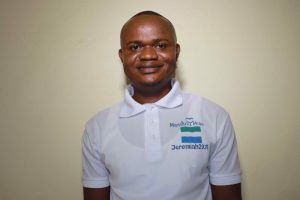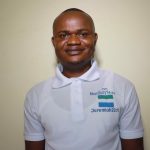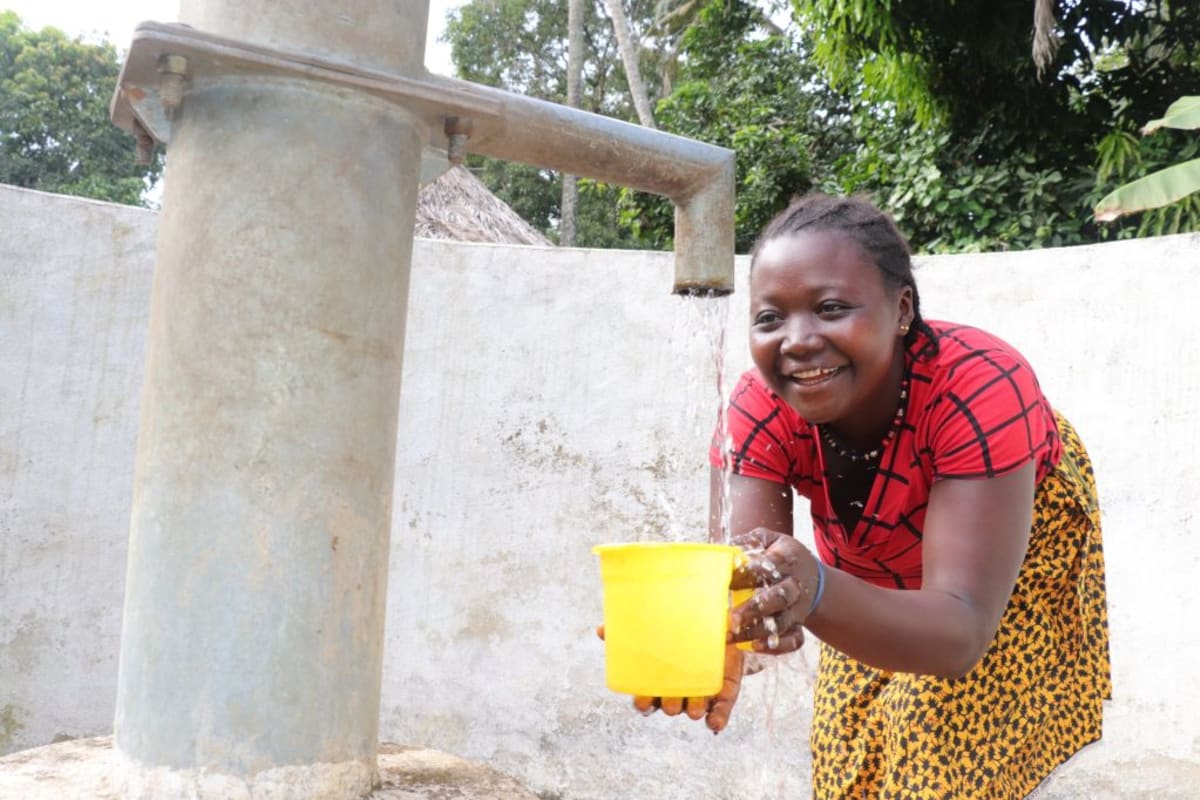October, 2022: Mathaineh Community New Borehole Project Complete!
We are excited to share that there is now a safe, reliable borehole well at Mathaineh Community. As a result, community members no longer rely on unsafe water to meet their daily needs. We also conducted hygiene and sanitation training, which focused on healthy practices such as handwashing and using latrines.
"I was very challenged fetching water from the swamp because of the long distance and the filthiness of the water sometimes," said 17-year-old Rugiatu K., to whom we spoke when we first visited Mathaineh.

Rugiatu pumps water at the new well.
"The water I used to fetch was not enough to use daily," Rugiatu continued. "I had nothing I could do to fetch more because that was the amount that my energy could allow me to fetch to my house. I used to experience a stomachache when I was drinking water from the swamp well. I could not get enough time in the day to do my school assignments at home because I had to fetch water and complete all the domestic activities before the end of the day."

Rugiatu dances with other community members in celebration.
"It is a good moment today because of the new water well in this community, where I am now fetching enough water to my house in a fleeting time," Rugiatu continued. "This new water well is exceptionally clean, and it has been treated to make it very pure for us to drink. I am grateful for this water well. Today, I am happy because it is now quite easy to fetch water from this new water well to do all my activities and go to school earlier. Thank you."
Adults were just as happy about the new waterpoint.
"It was not easy for me to fetch clean water from the swamp well because the water could easily get dirty after few people had fetched water," said 38-year-old Isatu Bangura, another person we interviewed on our first visit.

"The water that I used to fetch had a salt taste. This was also a saddening moment in this community, because it was difficult to drink water with a salt taste, especially when you [were] desperately thirsting for water. This also was causing diarrhea in this community, especially in children.

Isatu and Rugiatu carry water during the celebration.
"I am personally happy today with this new water well that we have gotten in this community," Isatu continued. "It is now quite easy for me to fetch water at any time I need to use water. The water we are now fetching from this new well is clean, and I have seen it [being] chlorinated. I am incredibly grateful for this opportunity we have received. I never believed that this would happen, but there is nothing God cannot do. I am incredibly happy. Thank you."
We held a dedication ceremony to officially hand over the well to the community members. Several local dignitaries attended the ceremony, including representatives from the Ministry of Water Resources, the Ward Council, and the Port Loko District Council. Each official gave a short speech thanking everyone who contributed to this water project and reminding (the staff and students OR community members) to take good care of it. Then, Rugiatu and Isatu made statements on their community's behalf. The ceremony concluded with celebration, singing, and dancing.

New Well
The drill team arrived the day before beginning work. They set up camp and unpacked all their tools and supplies to prepare for drilling the next day. The community provided space for the team to store their belongings and meals for the duration of their stay. The following day, work began.

Our team dug two pits next to the drill rig, one for the drill’s water supply and another for what the drill pulls out of the borehole. In some cases, we order a private supplier to deliver the water for drilling since water access is already challenging.
Day one of drilling began as the team mixed water with bentonite, an absorbent clay, in the two dug pits. Next, the team fixed a four-inch carbide-tipped bit to the five-foot-long drill stem. They started the mud pump to supply water to the drill rig so that drilling could begin!

After putting each five-foot length of drill stem into the hole, the team took material samples. We labeled the bags to review them later and determine the aquifer locations.
On the second day of drilling, the team expanded the hole and cleared it of mud. After reaching a total depth of 22 meters, the team forcefully pumped clean water into the well to remove any dirt and debris from the drilling process. We then protected the screened pipe by adding a filter pack. The team hoisted the temporary drilling casing to fortify the pipes with cement.

Next, we bailed the well by hand for three days before conducting a yield test to verify the water quantity. This well has a static water level of 14 meters. With these excellent results, we installed a stainless steel pump. Water quality test results showed that this was clean water fit for drinking!

New Knowledge
Before conducting any hygiene training, we called and visited the local water user committee to understand the community’s challenges and lack of sanitation facilities. We shared the findings from our discussions with the committee members to help them make the necessary adjustments before the training began. For example, we identified households without handwashing stations or ones that may need to repair their latrines. With this information, community members worked together to improve hygiene and sanitation at home.
After this preparatory period, we scheduled a time when members from each household using the water point could attend a three-day hygiene and sanitation training. We then dispatched our teams to the agreed-upon location to hold the meeting.

Training topics covered included handwashing and tippy taps, good and bad hygiene habits, disease transmission and prevention, COVID-19, worms and parasites, proper dental hygiene, proper care of the well's pump, keeping the water clean, the cost recovery system, the importance of using dish racks and clotheslines, the importance of toilets, keeping latrines clean, balanced diets, the diarrhea doll, and HIV and AIDS.

A community member demonstrates handwashing.
One of the topics that spurred the most discussion was handwashing. Participants were eager to learn how they could construct their own handwashing stations, called tippy taps, to prevent the spread of disease in their community. Many people volunteered to demonstrate handwashing and be critiqued on their technique by their neighbors, which made everyone laugh.

Constructing tippy-taps.
One of the training participants, Sadiatu Wurie, is a nurse at the local community health post, and she said Mathaineh had one of the higher rates for diarrheal disease in the region. She reminded everyone that proper handwashing would help them save their money and their loved ones' lives.

Participants sort illustrations of disease transmission chronologically.
Sadiatu also admonished parents for not taking their infants for immunizations, since there has been a recent outbreak of measles in Mathaineh's county. The mothers in attendance said vaccines make their children cry and not sleep, so they feared taking them in for more shots. Sadiatu worked out a time to revisit the community so she could track down all the unvaccinated children and schedule vaccinations for them.
"This training has really helped enlighten me about the important things that I was ignoring in my life," said the new water user committee's chairperson, Mariatu Kamara, 24. "I do not think anyone in this community had ever had knowledge on the training topics, especially handwashing. Because we are illiterate and so we [have not had] the opportunity to read or learn it elsewhere. That is why I am glad to witness this training because I could gain things that will change my life for good. I really understand everything because it has been discussed in our local language. Therefore, I am encouraging my fellow community members to follow all advice from the training, so that we all can live in a healthy community."
Conclusion
This project required a substantial collaboration between our staff, our in-country teams, and the community members themselves. When an issue arises concerning the well, community members are equipped with the necessary skills to rectify the problem and ensure the water point works appropriately. However, if the issue is beyond their capabilities, they can contact their local field officers to assist them.
Also, we will continue to offer them unmatchable support as a part of our monitoring and maintenance program. We walk with each community, problem-solving together when they face challenges with functionality, seasonality, or water quality. Together, all these components help us strive for enduring access to reliable, clean, and safe water for this community.
With your contribution, one more piece has been added to a large puzzle of water projects. In our target areas, we’re working toward complete coverage of reliable, maintained water sources within a 30-minute round trip for each community, household, school, and health center. With this in mind, search through our upcoming projects to see which community you can help next!
Thank you for making all of this possible!





 Borehole Well and Hand Pump
Borehole Well and Hand Pump
 Rehabilitation Project
Rehabilitation Project


































